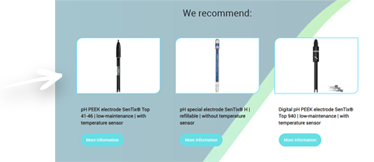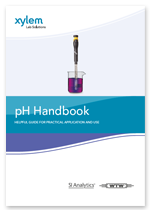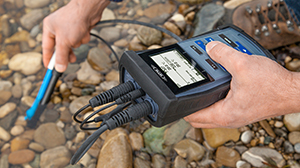- Interaction pH electrode – measuring medium
- Accuracy of the pH meter
- Accuracy of the temperature measurement
- Accuracy of the buffers used
- Care taken by the user
A frequent question in pH measurement is “How accurate is the pH electrode?” Interestingly, there are no specifications for it. It provides an mV signal that depends on the calibration and the interaction with the medium being measured, and it is not possible to give an accuracy specification for this.
In principle, the accuracy of the buffers used can never be exceeded whilst measuring pH. This means, for example, when using WTW technical buffers with a deviation of ± 0.03 pH, a measurement can never be more accurate than these limits.
“Tip: As a rule, one must reckon with an absolute accuracy in the laboratory of about 0.1 pH.”
More precise calculations can be found in DIN 19268: Here the user can estimate the influencing variables and then calculate a maximum accuracy for their application.

pH Electrodes Selector
Are you wondering whether the pH electrode you have chosen is the right one?
Simply answer 5 questions in our new tool and you will receive the right pH electrode for your application.
Start now!
The all-embracing pH handbook for every application area
 In this ultimate pH guide, you will find many application examples, graphs, tables and diagrams, which provide you with everything you need to know about pH from our experts' years of experience, clearly and concisely on 100 pages. Other relevant questions on the pH parameter are also covered in the blog articles: Download the pH handbook now free of charge as support for your everyday work.
In this ultimate pH guide, you will find many application examples, graphs, tables and diagrams, which provide you with everything you need to know about pH from our experts' years of experience, clearly and concisely on 100 pages. Other relevant questions on the pH parameter are also covered in the blog articles: Download the pH handbook now free of charge as support for your everyday work.
 Supplementary information on pH/Redox can also be found on our parameter page. If you have no more questions, you can easily request a quote for your digital pH electrode from us or order directly via our online store!
Supplementary information on pH/Redox can also be found on our parameter page. If you have no more questions, you can easily request a quote for your digital pH electrode from us or order directly via our online store!
Request a quote
Further questions are answered by our expert in the blog article FAQ pH measurement.
For helpful tips within your application area, you can read our blog articles:
Blog: Operation, care and storage of pH electrodes
Blog: What is the pH value?
Blog: Which pH electrode do I need? What is critical when choosing a pH electrode?
Blog: Calibration and adjustment of a pH electrode